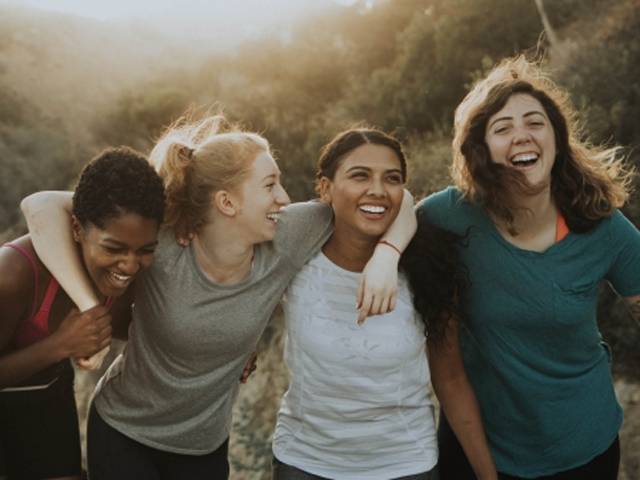Human Connection: Friendships and Mental Health

Human Connection: Friendships and Mental Health
Friendships aren't just about having people to share experiences with. As psychologist Caroline Anderson explains, friendships are crucial to not only our mental, emotional and overall health, but fulfil an innate human need, too.
Learn why we crave close-knit friends, how to have micro-moments of connection with friends and strangers alike, and steps you can take to improve and expand your friendship circle.
How many friends do we need for good mental health?
If good friends are so important to mental health, it begs the question: do more friends mean more health?
The internet is awash with what Ms Anderson refers to as 'pop psychology', citing a so-called magic number of friends to aim for.
"You'll often read that having 3 to 5 friends is a nice amount. But I think it's as simple as having one close connection," she says.
"We can have many connections around us, but if those connections aren't meaningful – if they're not based around emotional intimacy, developing trust, giving back and connection – then they aren't going to be that effective anyway."
So, rather than thinking about quantity, focus on the quality and variety of your friendships, says Ms Anderson.
"Think about the strength of your connections. The types of friendships are important too. Friends can play different roles in our lives and we can have different friends for different kinds of relationships."
Deep connections and deeper sleep
From deep friendships to mates (and workmates) that you share good times or a funny story with, the importance of human connections in life is in fact no laughing matter. According to Ms Anderson, having close bonds with people actually fulfils a deep evolutionary need.
"If you think about our evolution as human beings, we are really designed to be in social groups," she says. "[As part of a tribe] we could hunt larger amounts of food that we couldn't do by ourselves. We could build better shelter, have better protection from predators.
"Today, we have these huge societies and very complex social networks, but that desire to still have a close-knit community around us for our safety is really important."
So crucial are these connections that, according to some researchers, the human brain evolved with a clever protective mechanism which kicks into gear when we're socially isolated. Even today, this mechanism can affect the sleep of lonely people, according to one study.
"In this particular study," explains Ms Anderson, "the participants who described themselves as lonely had more of what's known as 'micro-awakenings' in their sleep."
Micro-awakenings are small moments in which you wake up mid-sleep, but don't remember; just short snippets of time where you rise a little from your slumber.
"Early humans literally weren't safe when they were asleep and away from their tribe. So, [if you're lonely], your brain won't let you go into a full sleep mode."
Lighten your mental health load
As well as potentially getting a better night's sleep, one of the more obvious mental health benefits of friendship is simply having someone to share your day-to-day life with, says Ms Anderson.
"The process of just being able to say things out loud, in itself, is an incredibly healing and therapeutic thing to do," she says. "Sharing your experiences, thoughts, feelings… your ups and your downs.
"Then there's all the fun stuff that comes with having friends – being able to engage in activities together."
For those struggling with depression and/or anxiety, giving a voice to what you're going through can bring particular benefits, says Ms Anderson.
"A really important intervention [or practice] that I do with my clients is slowly encouraging them to have the strength and courage to open up to their friends about what they're going through," she says.
However, sharing mental health struggles "can be one of the most challenging things to even contemplate" for some people, says Ms Anderson.
"My clients often say, 'Yeah, I've got these friends around me, but no, I could never tell them that I'm seeing a therapist or that I'm struggling with depression or on antidepressants'," she says.
"In all honesty though, it can be one of the most powerful things that happens. When they do start talking about their mental health issues, a lot of the time their friend will say 'I've had that too', or 'my mum/my friend has gone through something similar'.
"So it really normalises these issues. And just to be heard and supported, even if the friend just listens and does nothing else, can be incredibly powerful."
Social media vs socialising
With so many connections taking place on social media these days, do we still need to spend time with friends in real-life to get the benefits? Absolutely, says Ms Anderson.
"There is a small connection that happens over social media. You can be in the loop about where people are or what they are doing, for example, but in terms of a benefit to our wellbeing, it's the face-to-face connection that really makes a difference."
Improving your social connections
If you're feeling socially isolated, there are some simple yet effective ways to improve and expand your friendship circle.
"The first approach is to broaden or strengthen the relationships that you already have," says Ms Anderson. "Start small. Look around at the people already in your social structure. Ask yourself: who could I do more things with, or have more connection with? Who could I message, who could I catch up with for a coffee?"
Once the social meet-ups or activities are happening, the next step often involves making the connection between you and the other person more meaningful.
Meaningful answers
Thinking about possible conversations ahead of time can be helpful for people who struggle with social anxiety, or who just find conversations difficult, suggests Ms Anderson.
"Think about what questions they might ask you. For example, if they ask you how you're going, how can you answer in a meaningful way?"
A helpful saying that Ms Anderson gives her clients is 'Add one more'.
"You give your normal answer to the question, but then add one more sentence… add more one piece of information. It helps get you out of your comfort zone. It's very simple, but it really helps get the conversation flowing."
So rather than just replying 'Oh I'm fine, thanks', when asked how you are, add one more sentence such as 'I went to a great restaurant last night', or 'I've taken up paddle-boarding, and I'm really enjoying it' or 'Work has been really busy, but I've got some annual leave coming up'.
Meaningful questions
When it comes to what else you can bring to the conversation, Ms Anderson says to "have some pre-planned questions before you meet up and make them interesting, make them little bit different."
Instead of asking broad, open-ended questions such as 'how are you?' or 'what's new?', Ms Anderson suggests you get a bit more specific. For example, ask how a particular project they're working on is going, or about a specific person in their life.
"This shows your interest, develops the connection and then people want to give back and ask more meaningful questions of you too."
Bigger networks & micro-moments
Another approach for women lacking social connections is to cast your friendship net further afield and make new friends. "This is where technology can be really helpful", says Ms Anderson.
She suggests the MeetUp website, which lists social groups that you can connect with in your local area. "They cover every hobby and interest out there. For example, if you love bush-walking but don't have anyone to go with, there are groups for that. It's happening all around us!"
A final piece of advice from Ms Anderson is to practise connecting with people in micro-moments. Micro-moments are short connections that you can experience with anyone: friends, colleagues, strangers, even people who you may never see again.
"You might be at work and talking about what you did over the weekend. These types of conversation can sometimes feel really superficial. But if you put in some effort and bring some authenticity to conversation, it can feel really heart-warming and genuine."
In terms of the benefits of micro-moments, Ms Anderson refers to the interesting work of American researcher and psychologist, Barbara Fredrickson. "What she found was that these micro-moments can actually regulate your heart rate and release a burst of the feel-good hormone, oxytocin."
"So even if you have no one around you, no close friends, you can have a genuine connection with the cashier person at the supermarket. Stop, make eye contact, ask them how their day has been.
"In our busy world it's something that we forget to do. Just stop and realise the positivity and warmth that comes from general human connection."
Read more about loneliness and the physical effects of social isolation
Published with the permission of Jean Hailes for Women's Health
jeanhailes.org.au
1800 JEAN HAILES
(532 642)
MORE



